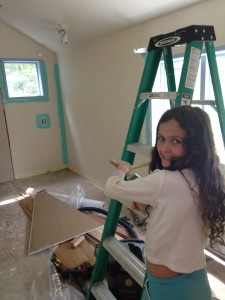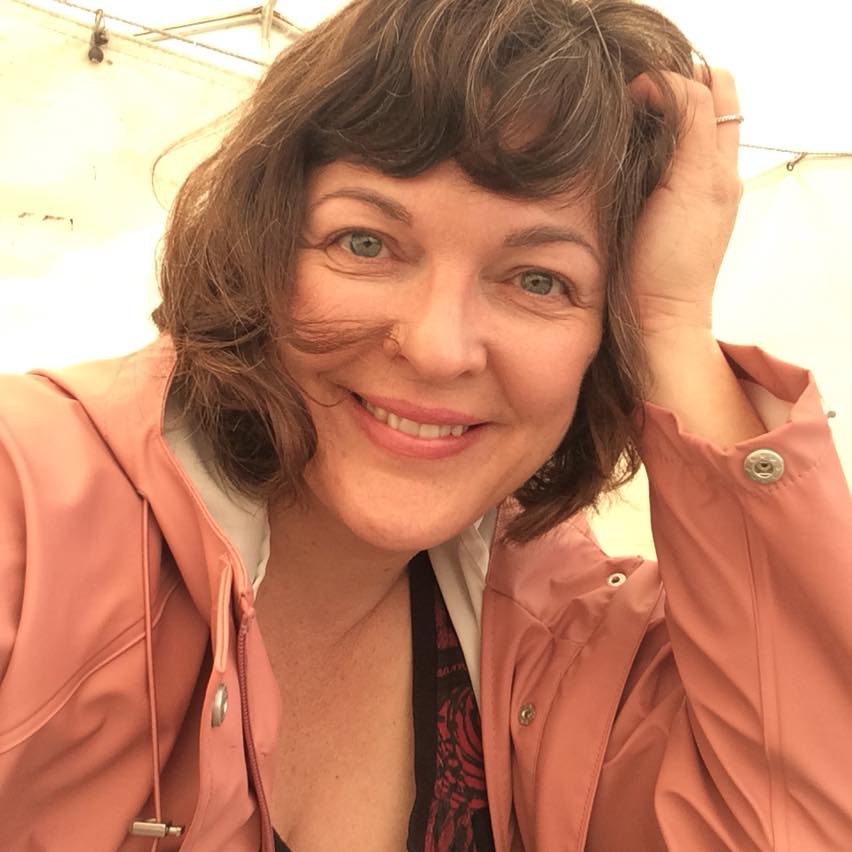As I wait for Nora to come back with a straw I peer over the soft checkered shoulder of the elderly man sitting in front of me in the bakery. He is fingering a well worn piece of paper. I recognize it immediately. This is a poem he wrote. Only one other person has seen it. The person he asked to type it out on the computer for him. He doesn’t know how to use a computer and he doesn’t know how to type with more than two fingers. He may as well have stumps for hands, he feels, in this world. Cut off. Inarticulate. He grew up in a time when a handshake was everything. But now, nobody does anything in person any more. This “intranet.” Family reunions. Buying shoes. Making love.
I imagine he’s retired. An electrician perhaps, or a carpenter. A small man with nimble worn hands and creases around his eyes that tell me he has squinted in order to be exact for the majority of his life. The poem is called “A man and his dog.” It has a large chocolate stain on it. Oh he swore a blue streak when that donut dropped out of his hand. This was his only copy. He reads it over furtively. I can’t make out the poem, only the title, but out of respect I don’t read it anyway. Already I have seen too much of something intensely private. But because he brought it to the bakery, I wonder if he unconsciously hopes someone will read over his shoulder and be moved to the point of tears or cry out, “Did you write that?!”
A beautiful woman, around the same age, slides into the seat opposite. He quickly slips the chocolate covered poem back into a ratty yellow folder as though it never happened. He rests his hand on top of it, protectively. He hasn’t worked up the nerve to try and get it published. Not yet. Maybe if he reads it over another three hundred times it will tell him whether it’s worth saying. He feels it is. Sure. It’s precious to him. It pulls like the cry of a child who has skinned her knee. Like the groan of a lover with the first private touch of the evening. Like the blue sky that aches itself into a bruisy purple as the day closes with all its missed glory. He hardly looks at her, this lady friend. And it’s too bad because she’s stunning. She is very Commercial Drive. Some kind of hand dyed skirt with excellent fabric. A beautiful silver bangle wrought by an artisan, probably local. Tanned wrinkled skin and long silver hair: stylish, intelligent, warm. She speaks about glades and a rare colour of rhododendron. I suspect she has read all of the poems in his folder. I suspect she has no idea how to tell him they are terrible from a critical point of view. I suspect she says nothing, which is why he has stopped looking at her lately. I suspect she loves the poems because he wrote them, and for that reason alone, they are precious. She wishes he did not feel the need to publish. 
But I sit behind him now, and I pray for him, one writer to the next. I pray he takes a class. Because I do believe if he loves to write and burns to write about this boy and this dog, then he must write about this boy and this dog because someone needs to hear it. And if he keeps writing and keeps filling that yellow ratty folder with paper napkins from restaurants, with ends of hydro bills, with the back of receipts all scribbled up with ideas, the words will eventually become water and flow all liquidy onto the page. He could very well blossom into the guy that people say, “Did you know this Canadian poet didn’t write a single thing until he was seventy three? He was an electrician all his life.” (Because, you know, that story about Harrison Ford starting out as a carpenter is getting a little stale.) But writing poetry is as halting and hard right now as learning mandarine. The brain feels as crusty as old bread. Yes, we know English, we are speaking English, but to speak it beautifully requires its own language with its own tone. An “a” is no longer an a. It is a completely new character. One moment it means respite, the next it means ouch, the next it means a curt dismissal, the next it means “I remember you fondly, my old friend.”
Nora is back with her straw and milk and her knees all painted the colour of her new bedroom. I let her edge, and then I let her roll, because she did it so well. She worked six hours yesterday, and not just because it is mother’s day, but because she loves industry. I am perhaps the proudest I have ever been. This work ethic will serve her well. She painted her first little room (a hideaway cubby bright orange) at the age of six. Three years of practice now. Not many streaks. Not many drips. She wore a dress on purpose today so she could show off her knees: all covered in turquoise smudges.


